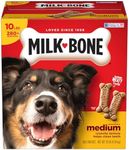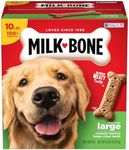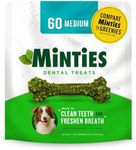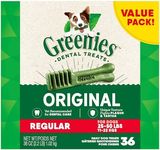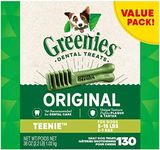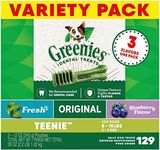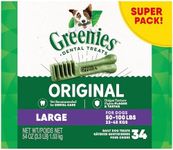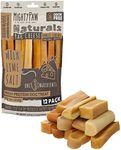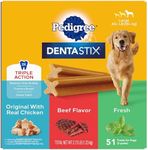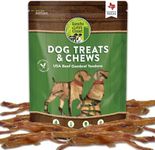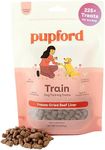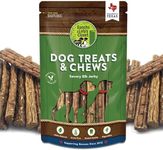Buying Guide for the Best Dog Chew Treats
Choosing the right dog chew treats can be a bit overwhelming given the variety available in the market. The right chew treat can keep your dog entertained, help with dental health, and provide a tasty reward. To make the best choice, consider your dog's size, chewing habits, dietary needs, and any specific health concerns. Here are some key specifications to help you navigate through the options and pick the best fit for your furry friend.IngredientsIngredients are the components that make up the chew treat. This is important because it affects the treat's nutritional value and safety. Look for natural ingredients and avoid artificial additives, preservatives, and colors. If your dog has allergies or dietary restrictions, choose treats that are free from those specific allergens. For example, if your dog is allergic to chicken, opt for treats made from other protein sources like beef or lamb.
Size and ShapeThe size and shape of the chew treat should be appropriate for your dog's size and chewing strength. Small dogs need smaller treats that they can handle easily, while larger dogs need bigger treats that won't pose a choking hazard. The shape can also influence how long the treat lasts and how engaging it is for your dog. For example, longer, stick-like treats can keep a dog occupied for a longer time compared to small, bite-sized pieces.
HardnessHardness refers to how tough or soft the chew treat is. This is important because it affects how long the treat will last and how it will impact your dog's teeth. Softer treats are better for puppies, older dogs, or dogs with dental issues, as they are easier to chew. Harder treats are more suitable for strong chewers and can help clean teeth and gums by reducing plaque and tartar buildup.
FlavorFlavor is the taste of the chew treat, which is important for ensuring your dog enjoys it. Common flavors include beef, chicken, bacon, and peanut butter. If you know your dog's favorite flavors, choose treats that match those preferences. If you're unsure, you might need to try a few different flavors to see which one your dog likes best.
Nutritional ValueNutritional value refers to the vitamins, minerals, and other nutrients that the chew treat provides. This is important for maintaining your dog's overall health. Look for treats that offer additional health benefits, such as those fortified with vitamins or those that support joint health. If your dog is on a specific diet, choose treats that align with their nutritional needs.
DurabilityDurability refers to how long the chew treat will last. This is important for keeping your dog entertained and ensuring you get good value for your money. Some treats are designed to be long-lasting and can withstand heavy chewing, while others are meant to be consumed more quickly. Consider your dog's chewing habits and choose a treat that matches their chewing intensity.
